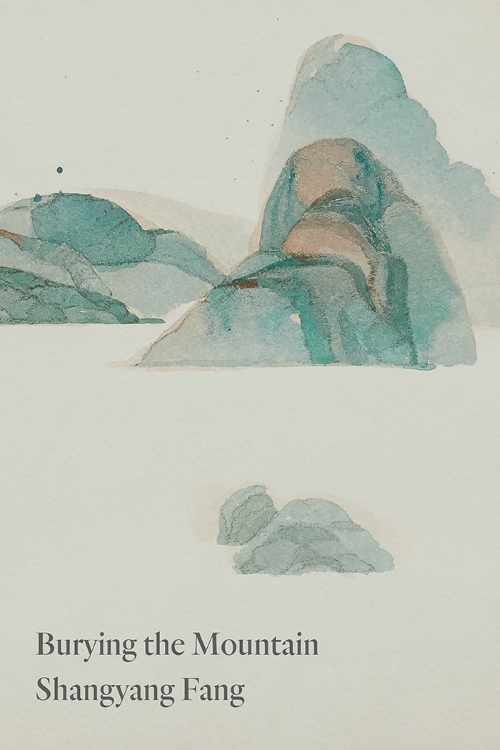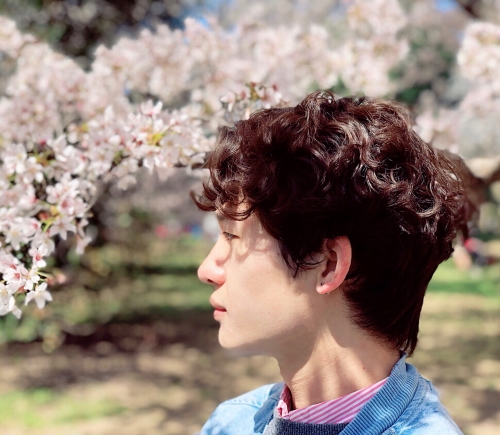Nude Descending a Staircase
“When I take off my bra, I’m unfettered like a soaring warbler,”my cousin told me while slipping off her straps in front of a mirror.Her hair was unbound. Her naked spine arching. The air outsidesmoldered with the chirping of insects. I felt bashful watching her hair-shaded nape.Her cardamom-like nipples bloomed in the mahogany frameof the mirror. She felt at ease. Perhaps she thought I was stilltoo young? That I was more of a boy than a man?Or perhaps she saw that day, by the rosemary alley,a boy kissing my lips. He tasted like blueberries. The sudden rain stopped my thinking. The sudden rain stopped the flirtingof summer birds, shaping a formless cage.“This rain ruined my day, & my date.I’m supposed to be at a party by now,” she said, brushing her hair,appreciating her reflected flesh, her lips two slices of a plum.As if in the mirror she were admiring that painting by Duchamp.As if she were trying hard to decode her body; the breezefrom the ventilation fluttered her hair as she looked outside— at the yellowish lampposts,the road luxuriant with oil. And thenshe sang as if to become a cello wholly would helpto recognize her untuned body. As if by giving up her shapeshe expressed her shape fully. Her hourglass waist.& the rain like sand falling. Could this afternoon & the afternoon of yesterday be understoodthrough her moving body? She sang as if the worlddepended on her tongue, the way musicians depend on theirinstruments. Though what holds her here in front me is still a mystery.Was it my eyes fixing her in an articulated design, the mirrorsuspending her escape, her skin of cello-lacquered membrane,or her glowing eyes reverencing her flesh, decodingNude Descending a Staircase? Or perhaps it was the air, only the air that mattered.As Duchamp put it himself, “The whole idea of movement,of speed, was in the air.” She would have weptif she’d seen the painting, a headless cello movingthrough a forest of many solid, tangible geometriesof loneliness & desire—a dreamconstituted entirely of disappearing. After she left, the vision of her nude loomedupon the silver of the mirror. I walked toward it,taking off my clothes. That small bodywhose desire is not by nature’s strict design. My skin smelled like rain, naked. My hair smelled like the black black earth.Eyes closed, I ran fingers over my clavicle, playinga silent instrument. On the balcony, a mantis leaped& became a part of a leaf. I thought of myself spending a whole afternoon staring at a tree, thinking myself a tree.I thought of the painting, how strokes of desirepoured out of a motionless body perpetually moving;how loneliness dissected that bodywithout a galloping thrash. Fear to smash a cello& find there was no music inside. To admit it was fingersthat made music, it was looking that made beauty. Not me. Not me.I look into the mirror, as if through my cousin’s eyes—that afternoon, in the rosemary alley, a boywas kissed by another boy, & both of them tasted of blueberry.
Feature Date
- September 16, 2021
Series
Selected By
Share This Poem
Print This Poem
“Nude Descending a Staircase” from BURYING THE MOUNTAIN: by Shangyang Fang.
Forthcoming from Copper Canyon Press October 2021.
Copyright © 2021 by Shangyang Fang.
All rights reserved.
Reproduced by Poetry Daily with permission.

Port Townsend, Washington
In Shangyang Fang’s debut Burying the Mountain, longing and loss rush through a portal of difficult beauty. Absence is translated into fire ants and snow, a boy’s desire is transfigured into the indifference of mountains and rivers, and loneliness finds its place in the wounded openness of language. From the surface of a Song Dynasty ink-wash painting to a makeshift bedroom in Chengdu, these poems thread intimacy, eros, and grief. Evoking the music of ancient Chinese poetry, Fang alloys political erasure, exile, remembrance, and death into a single brushstroke on the silk scroll, where names are forgotten as paper boats on water.
Poetry Daily Depends on You
With your support, we make reading the best contemporary poetry a treasured daily experience. Consider a contribution today.




